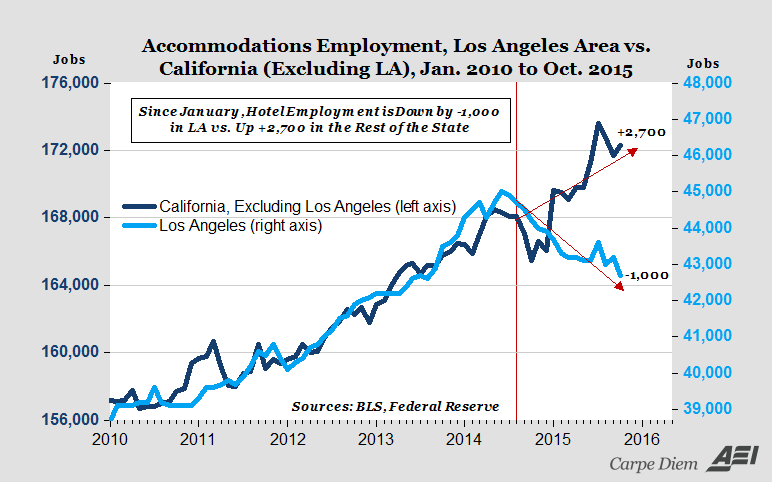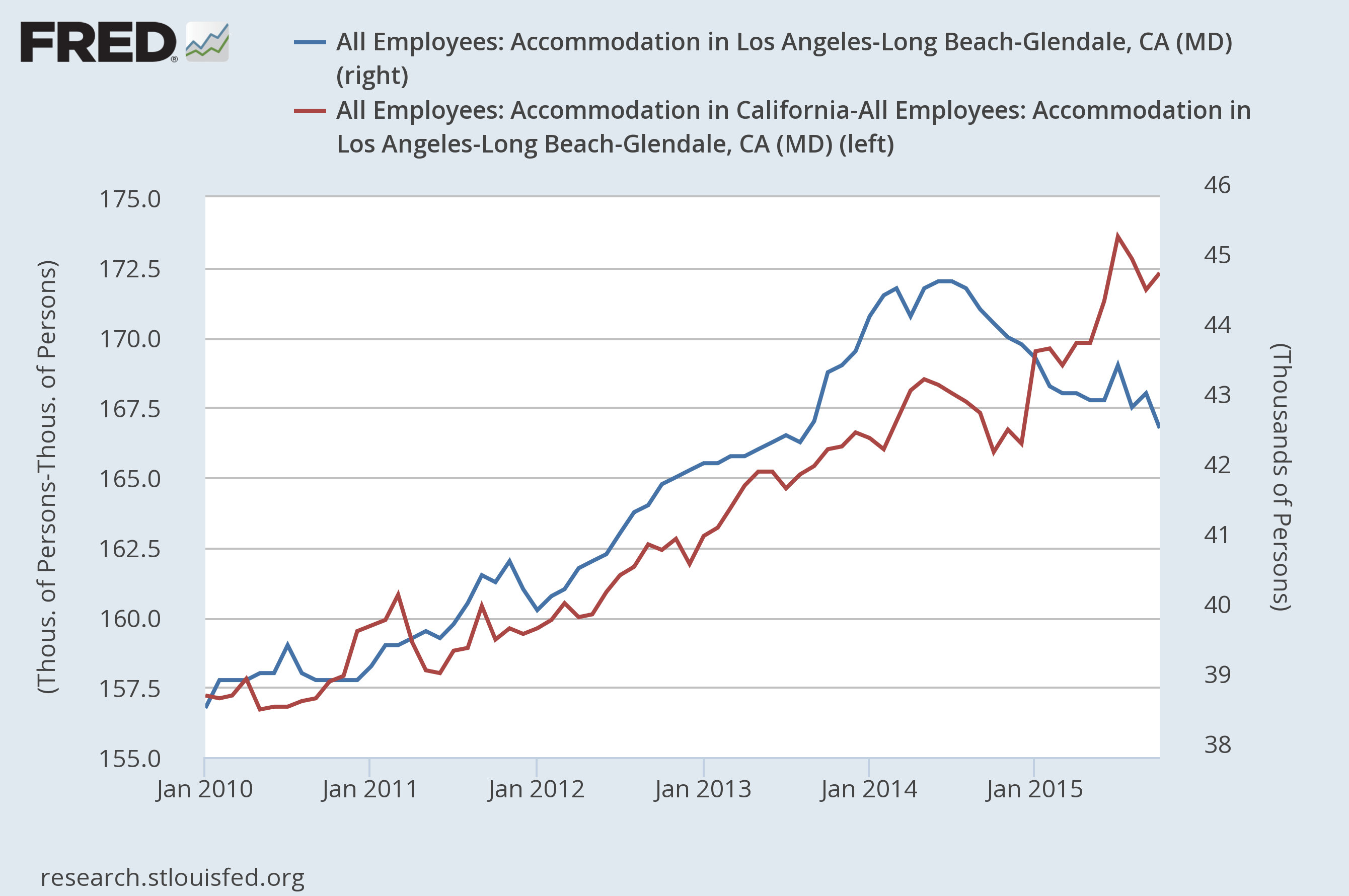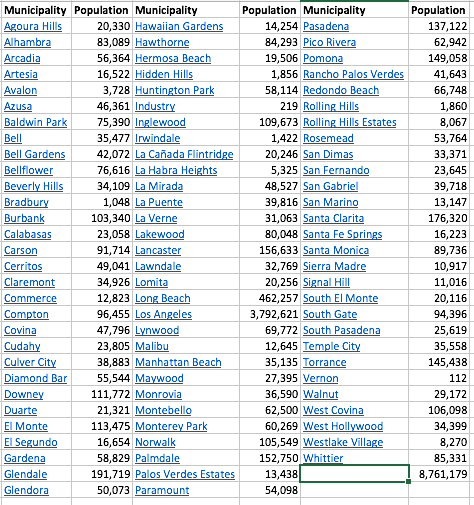@TBPInvictus here
The AEI’s Mark Perry has taken his nonsense – his Lies About Geography and Minimum Wage Tour – on the road, changing venues from Seattle to Los Angeles. It’s more of the same purposely misleading, intellectually dishonest* dissembling about the minimum wage.
Says Perry (emphasis mine):
Earlier this year, the city of Los Angeles passed the “Los Angeles Hotel Minimum Wage Ordinance,” which raised the city’s minimum wage for hotel workers to $15.37 an hour on July 1. According to BLS industry employment data through October, hotel employment has fallen by 1,000 jobs in the LA metro area since the beginning of the year, while at the same time hotel employment in California outside of the LA area has increased by 2,700 jobs. Coincidence?
For the uninitiated: City ≠ Metro Area. Very, very far from it. However, it makes for an easy way to confuse the uninitiated into the technical arcana of employment and wage data. The success of this nonsensical sleight of hand hinges on audiences that don’t understand the distinctions.
This chart accompanies the commentary:

Perry (as far as I can tell) is using the Los Angeles-Long Beach-Glendale Metropolitan Division (MD) as a proxy for the “Los Angeles Area.” I can about replicate the chart (y axis scales are a bit different) over at FRED:

For the record, I have not followed, and don’t know much about, the LA minimum wage legislation.
However, I know a thing or two about Metropolitan Divisions and Metropolitan Statistical Areas. As I’ve repeatedly pointed out, Perry has deceitfully referenced the huge “Seattle MSA” when it is only the city proper that raised its minimum wage. (As it relates to Seattle, the MSA Perry references is comprised of three counties – King, Snohomish, and Pierce. King alone has 39 cities/towns/villages.)
So, what do we know about the LA-Long Beach-Glendale MD? Well, it’s only one county – Los Angeles County. What can we glean about Los Angeles County? A quick Google search informs us that the County of Los Angeles is comprised of 88 – that’s 88 – distinct cities, as follows:

(Source: Wikipedia – which uses 2010 Census data; more recent estimates place total population at ~10 million)
We also know this: The most recent read for the series Perry is using to represent the “LA metro area” is 42,700 Accommodations (NAICS 721) workers in the (much larger) MD. The most accurate data for the city proper come from the 2012 Economic Census (below). Here are both the county and the city in 2012. Seeing them this way gives us much needed clarity on how much larger the county is than the city – 1,183 establishments versus 431; 43,203 employees versus 17,120.
Conclusion: In 2012, we can see that there were 752 establishments and 26,000 employees outside the city but within the county. That’s 64% of the establishments and 60% of the workforce. Yet Perry would have us believe he’s on to something with his broad brush analysis and conflation of the “city” with the “area.”
Finally, we also know that the County’s 4,752 square miles are some 9.5 times the city’s 503.
As with Seattle and Chicago, it should be clear that there’s not much to infer about a particular municipality by looking at its much larger MD or MSA. For the umpteenth time: It will be years before we are able to fully understand – to the extent that it’s even possible – what the effects of these local minimum wage increases are. There are myriad factors at play beyond the increase itself – rents, the saturation point of particular industries within a geography, migration patterns, demographics, etc. According to Bethany Jean Clement at the Seattle Times, there’s evidence – counter-intuitive and anathema to someone like Perry – that “outlying areas are raising wages to compete with Seattle’s rising minimum, rather than restaurants fleeing the city as some feared.” Perry’s slipshod, knee-jerk economic “analysis” is, in a word, shameful.
Post script to AEI President Arthur Brooks (@arthurbrooks), who recently penned an op-ed for the NY Times (Choose to Be Grateful. It Will Make You Happier): I’d be incredibly grateful if AEI would demand intellectual rigor and honesty from all of its contributors, starting with Mark Perry. I’d be grateful to not spend countless hours rebutting his purposefully deceitful, agenda-driven drivel, as I’ve done for more than six months running now. I’d be grateful if Perry’s “analysis” didn’t rely on sleight of hand and obfuscation. And I know many people would be grateful right along with me. Whaddya say, Arthur, any interest in burnishing AEI’s tarnished image? Or are you content, on your watch, to let it continue sliding into irrelevance, with an all-too-appropriate “stink tank” appellation?
________
* This is a polite term for bullshit…



I know that in Upstate NY, each of the cities in the urban areas do not look at all like the surrounding suburban towns and villages in the county in any way with regards to demographics, income, property tax base etc. That is a primary reason why the urban school districts are languishing while suburban school districts a 10 min drive away are doing great.
I see even bigger problems than his “mouse and elephant” conflation.
So we are supposed to believe that the demand for hotel rooms move 20 miles away because the hotels are forced to increase prices by 10-15%?. Furthermore by some miracle people began booking rooms far away from where they needed to be, a year before the minimum wage increase was passed (and the presumed price increase it would precipitate was still years away). Sorry but if you want to make a causative argument (wages increase → prices increase → business and job loss) you need the causative event to appear before the consequences). Apparently not only is this guy a moron on a mission, he also think we devoid of all logic.
Maybe he can explain to us why people are willing to pay twice the price for a hotel room in Manhattan compared to what it would cost if they just head across the bridge? In the real world users will pay market rates to stay within a short distance of where they need to be. If there actually is a fall in hotel employment in an area, it is because there is no need for rooms, not because the price increased a little.
LOL, AEI’s Mark Perry. A couple of years ago I attempted to post information at his site which argued against his position. His solution? Banned me from posting…nuff said. Guy is a moron.
Little stat factor usually neglected even in pro-minimum wage raise discussions: even if employees lost 6% of jobs due to wage raise — and maybe even if they lost 6% growth in jobs — they could still see themselves ahead even if the wage gains were only 12%: same money for less work. More likely more money.
Labor should be treated just like anybody else who is buy and selling. Selling fewer units for the same price — or more — usually seen as pretty good deal.
It is unlikely that the hotel chains decided to close a building just because the price of employees went up. It is much more likely that the remaining employees are working longer hours. If people are just staying further away from UCLA, then the jobs are not lost, they just relocated to an area with a lower cost of living. This sounds like a win-win to me.
Even in the worst case scenario, 1,000 people lost jobs that were so terrible that they had to rely on government assistance just to make ends meet. It is not like those jobs were helping the economy, the government, or even the people working there. Those jobs should have been outlawed anyway, they are a net drain on the economy, and a net subsidy to hotel owners.
If a county the size of LA only lost 1,000 jobs, and each of those jobs was arguably miserable and counterproductive, then I say let’s repeat this experiment in every county in the U.S.
he cherry picks what data he uses, too…when Perry wrote about the Seattle MSA, he cited fast food employment because retail employment was up…